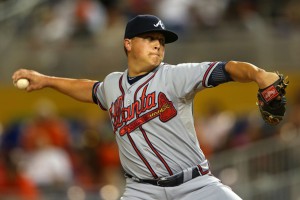
The team escaped Game 1 with a victory despite Gonzalez’s struggles. Photo Joy Absalon/US Presswire via usatoday.com
Nats take Game 1 of the NLDS 3-2.
You know your pitcher is having a rough day when the score line reads “2-0-0.” As in, 2 runs, 0 hits and 0 errors. That was the score at the end of the second, an inning in which Nats starter Gio Gonzalez had walked no less than four batters, thrown a wild pitch and given up a sac fly for the second run despite giving up zero hits.
TBS broadcast a stat showing Gonzalez’s ERA on various days of rest; the key stat was that he had a 5.80 ERA when he had more than 5 days rest. His days rest entering Game one of the playoffs? Nine days. He last threw in Philadelphia on September 27th.
Being able to rest your starters and “set up” your post season pitching rotation can be a blessing and a curse. Today it was a curse; clearly Gonzalez was overthrowing, missing his spots, and his pitching line showed it. He didn’t trust his curve early, was relying solely on his fast ball and couldn’t locate it to his desire. To his credit he settled down for a couple innings, got a couple of very timely plays in the field, and exited having given up a sole meaningless hit to go with seven walks in 5 innings. To me it looked like he was over-throwing, that he was “too strong.” Starters are creatures of habit; throw one day, rest the 2nd, toss the 3rd, bullpen work the 4th, rest the 5th and then repeat. When too many extra days are thrown in, younger guys can get off schedule.
In the first inning I thought perhaps Gonzalez was trying to “save” his curve for later in the game; a great strategy for professional pitchers who can do it. Instead of showing guys your whole arsenal the first time through the order, pound them with fastballs and make them hit your pitch. Then, in their 2nd and 3rd at bats mix in curves and off-speed stuff as out pitches as needed. If you play your cards right, you can work through each hitter’s 3 at-bats keeping them off-balance and suddenly you’re deep into the 6th or 7th inning as a starter. As it turned out, he wasn’t trusting his curve at all, and suddenly he was pressing to hit his spots.
Craig Stammen escaped an incredible jam in the bottom of the 7th, having loaded the bases with none out. Usually that situation has a run expectancy of somewhere greater than 2 runs but the Nats defense came through; an Ian Desmond force out at the plate for the first out then a clutch 5-4-3 double play to end the inning. Despite Tyler Moore‘s late inning heroics, this was the key of the win.
Adam Wainwright showed exactly why he’s a Cy Young candidate when he’s healthy; his curve-ball was absolutely fantastic on the night. The already-strike-out prone Nats fanned 10 times, many times on a fantastic curve that Wainwright was controlling and commanding to the outside corner. I was surprised when he got the hook despite being on 100 pitches; as it turned out he probably wasn’t going to finish 7 complete regardless. You can’t really fault the bullpen management by Cards manager Mike Matheny; he had his 8th inning guy on the mound (Mitchell Boggs) and the Nats beat him.
Other thoughts from watching the game:
- I scoffed aloud when the TBS announcing crew spoke of Ryan Zimmerman‘s defensive prowness and said that “he rarely makes throwing errors.” Really? I know they don’t watch Nats games normally but the narrative behind Zimmerman’s throwing issues on non-pressure plays is well documented in DC. He had 12 throwing errors on the year, and his 19 total errors tied him for 3rd in baseball. Sure enough, a throwing error in the bottom of the 8th put the lead-off guy on board and caused the inning to be far more stressful than it needed to be for Tyler Clippard. Guy on first with nobody out? Roughly an 85% chance he scores. For years I’ve defended Zimmerman and talked of the ridiculousness of “wasting” his defense by moving him to first, but the fact remains that every time he fields a routine ground ball I’m waiting for him to air-mail the throw. When Anthony Rendon is ready to hit at the major league level, I think the talk is going to be about Zimmerman moving to first and not Rendon moving to another position.
- For as clutch as Moore, Ian Desmond and Kurt Suzuki were on the day, Jayson Werth and Danny Espinosa were the opposite. TWICE Werth squandered bases-loaded situations with two outs, leaving a total of 7 guys on base. He may be our current lead-off hitter, but he’s normally a middle-of-the-order bat and he needs to capitalize on situations like that. In Werth’s defense (no pun intended), the over-the-shoulder grab was a game-saver in its own right, so on a day when he disappointed at the plate he made up for it in the field. Meanwhile it was not really shocking that Espinosa whiffed over and over; he led the NL in strikeouts on the season and was batting from his clearly weaker side.
- How about Tyler Moore? A fantastic job of hitting, hitting a pitcher’s pitch and not trying to do too much with it. The old “game winning RBI” stat went the way of the Edsel, but tonight the clubhouse knows exactly who won that game.
- Here’s to the return of “Clip-Store-and-Save.” Clippard escaped Zimmerman’s throwing error in the 8th and Drew Storen dispatched two of the best St. Louis hitters in a 1-2-3 ninth. The team has to feel great about its bullpen on the night. No worries about using your 3 best guys; they’ll all be able to go tomorrow then get a travel day of rest.
- The ridiculousness of the Hold stat: Boggs was credited with both a “Hold” and the Loss. How is that possible? Because he put on the go-ahead run that Mark Rzepcynski eventually allowed to score. I think the Hold stat would carry more weight if it was withheld from relievers who don’t actually “hold” the game at bay and who contribute to the blown save and (if applicable) eventual loss.
- The sideline reporter couldn’t help but compare the handling of Wainwright to Stephen Strasburg; both had Tommy John surgery last year. He said the Cardinals “trusted” Wainwright more and let him pitch 200 innings. But they didn’t really talk about the real difference: Wainwright is into the club option portion of his FA contract and is no sure thing to stay with the team beyond 2013. He’s also 30. Compare that to Strasburg; he’s 23 and is under team control for at least four more seasons, and is likely to be offered a multi-year contract that buys out those arbitration seasons and a couple of FA seasons beyond that (similar to the deal Gonzalez signed). The point is; the Nats know they’ve got this guy for years to come and clearly played it conservative with his re-hab. Why this point is glossed over by pundits and bloggers is beyond me. Every time I hear some know-it-all say things like, “there’s no proof that letting him pitch more than 160 innings will harm him” my blood boils. Well, there’s no proof to the other side either! The fact is you can either be reckless with your major investment and overuse him, or you can play it safe and hope for the best. There’s no guarantees in life and thus there’s no guarantee that Strasburg won’t blow out his elbow again in 2013. But on this point I can guarantee; had the team continued to ride Strasburg down the stretch, push his innings to 190-200, and then he re-injures himself in the last week of September? You can guarantee all those know-it-alls would immediately be clucking their tongues about how the Nats “mis-used” Strasburg and should have played it safer. I don’t envy Mike Rizzo this post-season, because unless the Nats win the world series there’s going to be the inevitable stories about how the Nats would have won had they kept their Ace in the rotation. To borrow a quote from Major League, “Well, I guess then there’s just one thing left to do … win the whole !?@& thing.” (link NSFW)
Great comeback by the Nats, snatching a win in a game they probably should have lost. They now have the split in St. Louis and are in a commanding position to win this short series.

